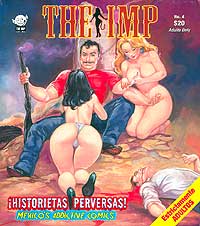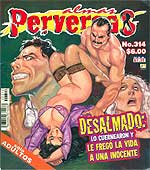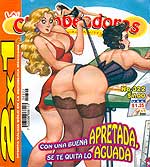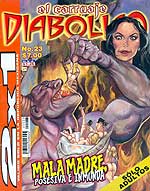
|
Up until fifteen years ago, Mexico had the highest number of indigenous comicbooks per capita in wold, according to Raeburn. However, the numbers have dwindled to less than a quarter what they once were. To keep up circulation many historietas, or "little histories," have moved from romance and westerns to some of the most extreme perversity of any medium anywhere. The Spanish names for this new subgenre must remain unprinted but Raeburn calls them "Ghetto Librettos." Aimed at the Spanish-speaking Pan-American underclasses living "la vida de cuadritos," or the hard life, the popularity of these books has expanded throughout the Americas. Exclusively en espanol, they remain tantalizing yet inscrutable to a gringo like me. Wondering what they were all about, with a cocked eyebrow I have thumbed through them at New York subway newsstands.
 "Almas Perversas"
"Almas Perversas" |
For strictly "journalistic" purposes I picked up a few, including "Almas Perversas" ("Perverse Souls"), "La Chambeadoras" ("The Chambermaids") and "El Carruaje Diabolico" ("The Devil's Carriage.") "Almas Perversas" has the most notorious reputation, and it becomes Raeburn's touchstone. The issue I got seems to be about a man whose wife confesses that their voluptuous daughter is not his. He smothers the wife and gets the daughter drunk at the funeral, then rapes her. Once she learns of her true genealogy, she becomes his lover, in spite of his hand getting mangled in an unrelated, purely sensational work accident. Now handless, the cuckold finds the real father and tricks him into raping his own daughter. Then there appears to be some sort of twist, sending the amputee to prison where he hangs himself.
 "Las Chambeadoras"
"Las Chambeadoras" |
Like the gonzo comix critic he is, Dan Raeburn went to the source, Mexico City, to learn more about these nasty little tomes. There he meets the creators who churn out 80 pages a week(!) for each title. A true cultural critic, Raeburn folds interviews, deep research and travel into an essay form that uses the little comix as a lens to examine everything from Latin-American history to the different uses of irony across cultures. In particular Raeburn uses the historietas to get at the Mexican way of life. For example, though sold openly on every street corner, these "ghetto libretti" are technically illegal, defying Mexico's obscenity laws. This way the government can be seen as opposed to them while still letting people make money. It works out well.
 "El Carruaje Diabolico"
"El Carruaje Diabolico" |
With intelligence and humor Raeburn's writing mixes up the highbrow world of 50-cent terminology with colloquialisms like "idjit," for "idiot." Never dry or academic, he often includes personal anecdotes like the absurd story of his torrid affair with "Peaches," the daughter of drug runner. Then he admits to making it all up. Then he says it's true, mixing up life and art as much as any historieta melodrama. Even the design, also by Raeburn, perfectly mimics the look of a typical historieta, right down the paper stock of cover. The man's commitment is total.
If comix criticism ever becomes sexy it will be Dan Raeburn and his "Imp" series that make it so. Mainstream cultural critics could take lessons from Raeburn's obsessive and sharp journal. This latest examination of Mexico's "underground" comix goes way beyond its seemingly obscure subject, becoming a funny, informative and thoughtful treatise that will appeal to anyone interested in world pop culture.
"The Imp" can be found at superior comic stores and alternative media outlets or it can be ordered directly from Dan Raeburn. Write to him for details.
TIME.comix will return December 18 with its annual Top 10 list for 2002. It will then return in early 2003
